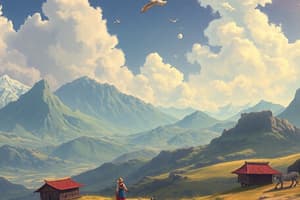Podcast
Questions and Answers
Which category of general knowledge includes significant events and important figures?
Which category of general knowledge includes significant events and important figures?
- Geography
- History (correct)
- Science
- Culture
What is a direct benefit of having strong general knowledge?
What is a direct benefit of having strong general knowledge?
- Developing artistic talent
- Learning programming languages
- Enhancing critical thinking skills (correct)
- Improving mathematical abilities
Which of the following methods is suggested to improve general knowledge?
Which of the following methods is suggested to improve general knowledge?
- Ignoring current events
- Reading books and newspapers (correct)
- Memorizing historical dates only
- Playing video games frequently
Which of the following figures is important to know in the context of general knowledge?
Which of the following figures is important to know in the context of general knowledge?
What is considered the highest mountain on Earth?
What is considered the highest mountain on Earth?
Flashcards are hidden until you start studying
Study Notes
General Knowledge Study Notes
-
Definition: General knowledge encompasses a wide range of information on various subjects, including history, geography, science, culture, and current events.
-
Categories of General Knowledge:
- History: Significant events, important figures, and timelines (e.g., World Wars, revolutions).
- Geography: Countries, capitals, landmarks, and physical features (e.g., rivers, mountains).
- Science: Basic principles of biology, chemistry, physics, and notable discoveries/inventions.
- Culture: Arts, literature, music, and traditions from different regions.
- Current Events: Recent news, political developments, and global issues.
-
Importance of General Knowledge:
- Enhances critical thinking and analytical skills.
- Aids in effective communication and social interactions.
- Useful for competitive exams and quizzes.
- Informs personal opinions on global matters.
-
Ways to Improve General Knowledge:
- Reading: Books, newspapers, and magazines.
- Watching Documentaries: Educational programs on various topics.
- Online Resources: Websites, podcasts, and online courses.
- Quizzes and Trivia: Engaging in trivia games to test knowledge.
-
Study Tips:
- Set aside regular time for reading and research.
- Create flashcards for important facts and figures.
- Discuss topics with peers to reinforce understanding.
- Follow reputable news sources for current events.
-
Key Figures to Know:
- Important historical leaders (e.g., Nelson Mandela, Mahatma Gandhi).
- Influential scientists (e.g., Albert Einstein, Marie Curie).
- Noteworthy artists and authors (e.g., Shakespeare, Picasso).
-
Fun Facts:
- The largest desert in the world is Antarctica.
- The human brain contains approximately 86 billion neurons.
- Mount Everest is the highest mountain on Earth, standing at 8,848.86 meters.
-
Practice: Regularly test your knowledge through quizzes and participate in discussions to enhance retention.
General Knowledge Overview
- General knowledge includes a broad spectrum of information spanning history, geography, science, culture, and current events.
Categories of General Knowledge
- History: Covers key events like the World Wars and notable figures such as revolutions leaders.
- Geography: Involves knowledge of countries, their capitals, significant landmarks, and natural features like rivers and mountains.
- Science: Encompasses fundamental concepts of biology, chemistry, and physics, along with notable scientific discoveries and inventions.
- Culture: Includes various forms of art, literature, music, and traditions from diverse regions globally.
- Current Events: Pertains to the latest news, political shifts, and pressing global issues.
Importance of General Knowledge
- Enhances critical thinking and analytical abilities, enabling informed decision-making.
- Facilitates effective communication and fosters social relationships.
- Essential for performing well in competitive exams and quizzes.
- Helps shape personal opinions and understanding of global affairs.
Ways to Improve General Knowledge
- Reading: Engage with books, newspapers, and informative magazines for diverse perspectives.
- Watching Documentaries: Provides visual and narrative context to various topics and issues for deeper understanding.
- Online Resources: Utilize educational websites, podcasts, and online courses for continuous learning.
- Quizzes and Trivia: Participate in trivia games to challenge and apply existing knowledge.
Study Tips
- Dedicate consistent time blocks for reading and research to build a routine.
- Utilize flashcards to memorize important facts and figures effectively.
- Discuss different topics with peers to reinforce concepts and aid retention.
- Regularly follow credible news sources to stay updated on current affairs.
Key Figures to Know
- Historical leaders such as Nelson Mandela and Mahatma Gandhi stand as symbols of resilience and change.
- Influential scientists like Albert Einstein and Marie Curie significantly advanced our understanding of physics and chemistry, respectively.
- Significant artists and authors include Shakespeare and Picasso, key figures in art and literature.
Fun Facts
- Antarctica is the largest desert, highlighting the diversity of environmental classifications.
- The human brain is home to about 86 billion neurons, underscoring its complexity.
- Mount Everest, at 8,848.86 meters, is recognized as the highest mountain on Earth, attracting climbers from around the globe.
Practice
- Regularly engage with quizzes and discussions to reinforce knowledge and improve retention strategies.
Studying That Suits You
Use AI to generate personalized quizzes and flashcards to suit your learning preferences.




